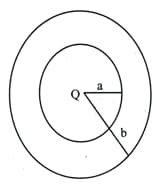Umakant Kondapure, Collin Fernandes, Nipun Bhatia, Vikram Bathula and, Ketki Deshpande Solutions for Chapter: Electrostatics, Exercise 3: Competitive Thinking
Umakant Kondapure Physics Solutions for Exercise - Umakant Kondapure, Collin Fernandes, Nipun Bhatia, Vikram Bathula and, Ketki Deshpande Solutions for Chapter: Electrostatics, Exercise 3: Competitive Thinking
Attempt the practice questions on Chapter 6: Electrostatics, Exercise 3: Competitive Thinking with hints and solutions to strengthen your understanding. MHT-CET TRIUMPH Physics Multiple Choice Questions Part - 2 Based on Std. XI & XII Syllabus of MHT-CET solutions are prepared by Experienced Embibe Experts.
Questions from Umakant Kondapure, Collin Fernandes, Nipun Bhatia, Vikram Bathula and, Ketki Deshpande Solutions for Chapter: Electrostatics, Exercise 3: Competitive Thinking with Hints & Solutions
A charge $Q$ is uniformly distributed over a long rod $A B$ of length $L$ as shown in the figure. The electric potential at the point lying at a distance $L$ from the end $A$ is

The region between two concentric spheres of radii and , respectively (see figure), has volume charge density $\rho=\frac{A}{r},$ where $A$ is a constant and $r$ is the distance from the centre. At the centre of the spheres is a point charge . The value of $A$ such that the electric field in the region between the spheres will be constant, is:

Two capacitors and are charged to and , respectively. It is found that by connecting them together, the potential on each one can be made zero. Then
The radius of earth is . Its capacitance will be
The capacity of an isolated sphere of radius is . When it is connected to an earthed concentric thin hollow sphere of radius , the capacity becomes . Then the value of is
Assertion: A parallel plate capacitor is connected across battery through a key. A dielectric slab of constant is introduced between the plates. The energy which is stored becomes times.
Reason: The surface density of charge on the plate remains constant or unchanged.
Assertion: The lightning conductor at the top of the high building has sharp pointed ends.
Reason: The surface density of charge at sharp points is very high resulting in the setting up of electric wind.
Putting a dielectric substance between two plates of condenser: capacity, potential and potential energy, respectively
